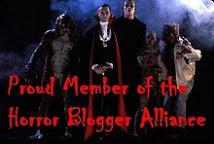Of course, looking back at this experience is pretty funny. And, I'd imagine the experience would be funny to anyone who was watching a tired driver run over a dead deer. And, I'd imagine it'd be even funnier if someone could hear the thoughts going on in my mind - which have now been posted here. I have no shame.
However, it's an interesting thing to consider when discussing Steven Spielberg's Made-For-TV debut film Duel, a bit of roadway terror that pits a meek and slightly pathetic motorist - played by veteran TV actor Dennis Weaver - against a malicious 1955 Peterbilt semi that seems intent on driving him crazy. I recently watched Duel - which I've seen quite a few times - with some friends, and I was surprised at how much they laughed at the film. It wasn't entirely a laugh that denoted mockery, but there were more than a few comments about how much of a "loser" Weaver's character is. I can't disagree too much - part of the film's appeal comes from how frantic Weaver is in his reaction to the demon truck - but I feel like this is one of those performances that is so on point that it might rub people the wrong way. (Kind of like every '80s movie that had Billy Zabka as a villain. Don't act like you didn't hate that guy. You did. But you hated him because he did what he was supposed to and did it well.)
I think the crowd caught on as the film went on - even if they were still a little bothered by him turning ALL THE WAY AROUND to look out his back window instead of using the rear-view mirror - which is a credit to Spielberg's mastery of suspense. Weaver is not painted as a hero we should root for - he's already tense as he drives and listens to talk radio before the truck shows up, and we don't see much into his life that makes us think the world really needs this doofus around - but we still sympathize with anyway. After all, he is being hunted methodically by a truck that doesn't even need the voice of Ted Levine to be creepy.
In fact, the truck is probably the hook that makes the film interesting, we might not have been able to stomach Weaver's sniveling lead if his adversary was anything less than what it is. The dirty, rust brown colored truck appears to be breathing most of the time, with smoke pouring constantly from the exhaust pipes and the engine. Spielberg lets the sound effects do a lot of the work, and these combine with Billy Goldenberg's musical score to make the truck sound a little more like a monster than an automobile. One famous sound effect at the end of the film was reused by Spielberg in Jaws, and it serves the same purpose in both films. Just like what we see in Jaws isn't just a shark to the viewer, Spielberg and crew do everything they can to remind us that this truck is not something we should be comfortable around.
As we'd expect, Weaver is not comfortable. Even though his sweaty and nervous behavior is a bit laughable, the sequence in a roadside cafe that allows him to weigh his options and look for his aggressor is crucial in developing his character and putting the viewer in his head. As we hear his inner monologue, we become absolutely certain that this man is not reacting to the situation that's around him in a rational manner. That doesn't make him a good hero, but it does make the film that much more interesting. We now know that this victim is susceptible to anything, and that keeps us just a bit more on edge than the film would otherwise.
After all, we shouldn't expect a normal person would react to a killer semi like a Hollywood hero would. (Just like we shouldn't expect me to chill after I ran over a dead deer and got jarred awake, right?) To me that's the beauty of Duel - the film is content to provide us a traumatic situation and hopes that we won't mind the potential victim being kind of a doofus. We're not sure the hero can save himself. And, even though we don't really like him, we can't help but worry - because we're not sure we could save ourselves in that situation either.
















1 comment:
I love this film!
Post a Comment